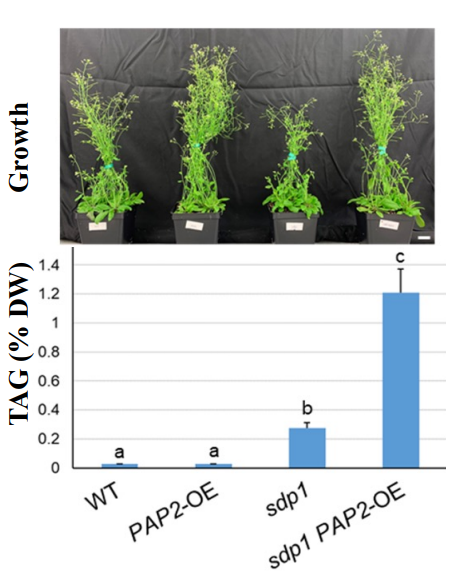Purple Acid Phosphatase2 Stimulates a Futile Cycle of Lipid Synthesis and Degradation, and Mitigates the Negative Growth Effects of Triacylglycerol Accumulation in Vegetative Tissues
Themes: Feedstock Production
Keywords: Biomass Analytics, Lipidomics
Citation
Cai, Y., Zhai, Z., Keereetaweep, J., Liu, H., Shi, H., Schwender, J., Xu, C., Shanklin, J. July 18, 2022. “Data for Purple Acid Phosphatase2 Stimulates a Futile Cycle of Lipid Synthesis and Degradation and Mitigates the Negative Growth Effects of Triacylglycerol Accumulation in Vegetative Tissues.” University of Illinois Urbana-Champaign. DOI: 10.13012/B2IDB-0843926_V1.
Overview

Storage lipids (mostly triacylglycerols, TAGs) serve as an important energy and carbon reserve in plants, and hyperaccumulation of TAG in vegetative tissues can have negative effects on plant growth. Purple acid phosphatase2 (PAP2) was previously shown to affect carbon metabolism and boost plant growth. However, the effects of PAP2 on lipid metabolism remain unknown. Here, we demonstrated that PAP2 can stimulate a futile cycle of fatty acid (FA) synthesis and degradation, and mitigate negative growth effects associated with high accumulation of TAG in vegetative tissues. Constitutive expression of PAP2 in Arabidopsis thaliana enhanced both lipid synthesis and degradation in leaves and led to a substantial increase in seed oil yield. Suppressing lipid degradation in a PAP2-overexpressing line by disrupting sugar-dependent1 (SDP1), a predominant TAG lipase, significantly elevated vegetative TAG content and improved plant growth. Diverting FAs from membrane lipids to TAGs in PAP2-overexpressing plants by constitutively expressing phospholipid:diacylglycerol acyltransferase1 (PDAT1) greatly increased TAG content in vegetative tissues without compromising biomass yield. These results highlight the potential of combining PAP2 with TAG-promoting factors to enhance carbon assimilation, FA synthesis and allocation to TAGs for optimized plant growth and storage lipid accumulation in vegetative tissues.
Data
- Seed oil & yield information
- TAG content